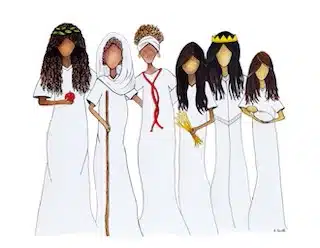Influential Women in Early Church History: Part 2 – Thecla

Article 2 of 5

By Rev. Dr. Jackie Roese
Founder and President of The Marcella Project
www.themarcellaproject.com
This article is part of the series Pursuing Partnership: Men and Women in Ministry.
The Inspiring Legacy of Thecla: A Modest Apostle and Martyr
Why must we hear the stories of our early Church mothers? Because our first-century sisters speak directly to the lives of women today, particularly women who minister. Many women who minister, whether paid or unpaid, volunteers or staff, feel alone, odd, or rebellious. This cloud of witnesses cheers them on as they show them the way forward. Stories like Thecla can encourage and embolden women today to run their race to win the prize. (1 Corinthians 9:24)
But that can only happen if we hear these stories in the context of their times. Before discussing Thecla, a first-century church mother, we must see her story through the same lens Christians viewed in the first century. We learn about Thecla from the writing of The Acts of Paul and Thecla, an apocryphal text not included in the canonical Bible. And if you’re anything like me, hearing the word apocryphal makes you suspect, you quickly disregard the work as unreliable. But that is not how the first-century Christians treated Thecla’s story. Thecla was venerated in the Church until the 6th century. The Acts of Paul and Thecla were told and retold as a model of a life of devotion to Christ.
When we learn of their stories, we discover that women like Thecla influenced the doctrine and practices of the early Church. That influence waned after Christianity was sanctioned as the main religion of the Roman Empire. That’s when we see women’s leadership in the Christian faith diminished. One reason is the Roman Emperor Diocletian specifically targeted and persecuted these women leaders because he feared they were disrupting the stability of the Roman family system. Choosing celibacy over marriage was not okay with Diocletian. Over the years, we start to see stories like Thecla go from inspirational teachings to footnotes to forgotten or perhaps recast as less significant than they were.
We aren’t sure who wrote The Acts of Paul and Thecla. Some believe it was Paul. Others argue it was written by a disciple influenced by Paul’s teachings. Still, others claim it was written by a group of early Christians trying to promote women’s role in the Church. Regardless of its authorship, The Acts of Paul and Thecla were embraced as authoritative by the early Christians. It is a text that provides insight into the beliefs and practices of the early Church.
The story of Thecla begins with her being betrothed to a man of high social standing. However, after encountering the teachings of the Apostle Paul, her life took an unexpected turn. Inspired by Paul’s preaching, she broke her engagement and embraced a life of celibacy. As mentioned, the decision to embrace celibacy in a culture that highly valued and enforced marriage and family was revolutionary. Thecla’s choice reflects a deep commitment to her newfound faith and a rejection of the expectations placed upon her by society. Her story mirrors the courage of early Christian martyrs like Perpetua, who faced persecution for their convictions.
Later in The Acts of Paul and Thecla narrative, Thecla encounters a powerful man named Alexander who seeks to force her into marriage. Thecla fought him off and was later dragged before the governor for assaulting the nobleman. She was sentenced to be eaten by the wild beasts in the arena. The next day, she was stripped naked, tied to a lioness, paraded through the city, then thrown into an arena. Thecla’s desire to meet such a gruesome fate underscores her commitment to Christ and her refusal to succumb to societal pressures. But God miraculously intervened on her behalf. The lioness ended up protecting her from a bear and lion in the arena. Despite the miracles, Thecla believed her day in the arena would end in death. She didn’t want to die unbaptized, so she decided to baptize herself. She jumped into a vat of water with dangerous seals, but lightning killed them. After witnessing multiple supernatural events, the governor ordered her to be free. These miraculous events remind us of similar stories in the Bible where God supernaturally intervened. Stories like Shadrach, Meshach, and Abednego and the walls of Jericho crashing down, to name a few.
For Thecla, this divine intervention affirmed her choices and her divine calling. It’s as if she heard God declare, “In you, I am well pleased.” (Matthew 3:17). Her story was told to offer hope for those who found themselves in the “arena,” literally or figuratively. The legacy of Thecla, as portrayed in The Acts of Paul and Thecla, continues to inspire, and resonate across generations. Her story challenges traditional gender norms, emphasizing the agency and strength of women in the early Christian community. The lessons especially encourage women in ministry to navigate cultural expectations with unwavering faith and remain loyal to their convictions, even when it comes at a cost. Thecla’s life is a testament to God’s provision and the enduring impact of those who follow their divine calling, regardless of societal norms.
This article is submitted by Wendy Wilson of Missio Nexus and of Women’s Development Track. Women’s Development Track is a Missio Nexus member. Member organizations can provide content to the Missio Nexus website. See how by clicking here.




Responses